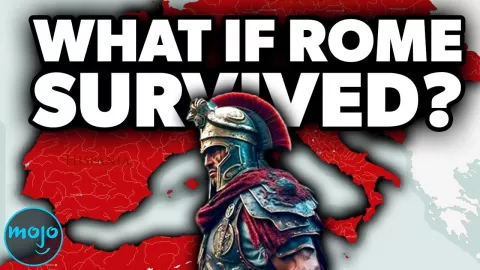What If The Roman Empire Never Fell?

What-If-The-Roman-Empire-Never-Fell
Welcome to WatchMojo, and today we’re going to dive into some speculative history: What if the Roman Empire Never Fell.
The Roman Empire, a colossal juggernaut that spanned nearly 500 years, stands as one of the most influential and enduring civilizations in human history. Emerging from the city-state of Rome in the 8th century BCE, the empire evolved from a monarchy to a republic, ultimately transforming into an expansive imperial power that left an indelible mark on the world.
Rome's trajectory began modestly, but its strategic location and military prowess catapulted it into prominence. The Roman Republic, established in 509 BCE, was characterized by a system of checks and balances, where power was distributed among elected officials. The republic's territorial expansion, driven by a combination of military conquests and alliances, laid the groundwork for the vast empire that would emerge.
By the 1st century BCE, Rome had extended its dominion across the Italian Peninsula, Mediterranean basin, and parts of Western Europe. The triumphant military campaigns of generals like Julius Caesar and Pompey brought unprecedented wealth and territory under Roman control.
The zenith of Roman power ushered in the Pax Romana, a period of relative peace and stability that lasted from 27 BCE to 180 CE. During this era, the empire experienced prosperity, flourishing arts, and cultural achievements. Roman law and governance systems became foundational pillars that influenced subsequent civilizations.
Cities like Alexandria, and Ephesus became bustling hubs of commerce, education, and intellectual exchange. Engineering marvels like the Colosseum and aqueducts showcased the Romans' unparalleled architectural achievements.
The Empire was a melting pot of diverse cultures, religions, and traditions. As it expanded, it absorbed and assimilated aspects of the conquered civilizations, creating a unique synthesis. Roman gods often merged with deities from conquered territories, fostering a sense of inclusivity. Latin became a unifying force. It was used in administration, governance, and eventually evolved into the Romance languages that persist today. The Roman alphabet, derived from the Etruscan script, laid the groundwork for many modern writing systems.
The Empire, despite its grandeur, faced internal and external challenges. Political instability, economic decline, and military pressures from barbarian invasions culminated in the fall of the Western Roman Empire in 476 CE. The Eastern Roman Empire, later known as the Byzantine Empire, endured until 1453 CE.
But what if the Roman Empire never actually fell? What could have happened in history if it endured?
Prosperity
In the alternate timeline we explore, Rome's resilience becomes a harbinger of perpetual glory. Diverging from the historical trajectory in the 3rd and 4th centuries CE, Rome undergoes a transformative political adaptation. Emperors, recognizing the value of sustainability, invest in revolutionary technological advancements. This propels it into an era of unparalleled prosperity, solidifying its status as a global powerhouse. The empire becomes a thriving hub of trade and commerce, its merchants navigating the seas to establish extensive trade networks that span continents.
Cultural Alchemy
As Rome's coffers swell, the cultural landscape undergoes an alchemical transformation. The 3rd and 4th centuries CE become a golden age of intellectual exchange, surpassing the heights of historical epochs. Libraries, academies, and schools burgeon with ideas, becoming crucibles of innovation. Philosophers and thinkers create a cultural flowering that permeates every facet of society. The arts flourish, scientific inquiry thrives, and the empire becomes a beacon of enlightenment for the known world.
Religious Harmony
Religion, historically a potent force in shaping Roman identity, becomes a cornerstone for unity. In this speculative reality, Rome embraces religious syncretism, forging a harmonious coexistence of diverse beliefs. While the imperial cult retains its unifying influence, a rich tapestry of religious traditions flourishes, creating a society where spiritual exploration harmonizes with intellectual pursuits. Once a melting pot of cultures, Rome stands as a testament to the enduring strength found in diversity.
Discovery and Influence
The geopolitical landscape of this speculative world is marked by widespread influence. Explorers, driven by insatiable curiosity, embark on voyages that transcend historical boundaries. The navy, armed with advanced shipbuilding techniques, navigates uncharted waters, discovering new lands and establishing cultural and trade ties with civilizations in Asia, Africa, and the Americas. Rome becomes a global influencer, transcending continental confines.
Technological Marvels
In this speculative reality, Rome's insatiable thirst for knowledge propels it into a technological renaissance. Scientific discoveries and engineering feats become the hallmarks of its ingenuity. Sustainable practices, harnessed through advanced technologies, lead to the early utilization of steam and hydraulic power. Rome's technological advancements become a beacon for progress, setting the stage for an industrial revolution centuries ahead of its historical counterpart.
Military Evolution
The military undergoes a radical transformation, adapting to the evolving dynamics of global politics. Strategic alliances and technological advancements lead to the development of highly efficient and disciplined armed forces. Pioneering early forms of gunpowder weaponry, Roman legions secure and expand the empire's borders without succumbing to the historical pitfalls of overextension.
Social Renaissance
Social progress becomes the cornerstone of this imagined Empire. Emperors institute policies that address social inequalities, empowering marginalized communities. Slavery undergoes reform, with gradual emancipation fostering economic vibrancy. The concept of citizenship evolves, embracing inclusivity and diversity, creating a society where all are united under the banner of Roman civilization.
Legacy
